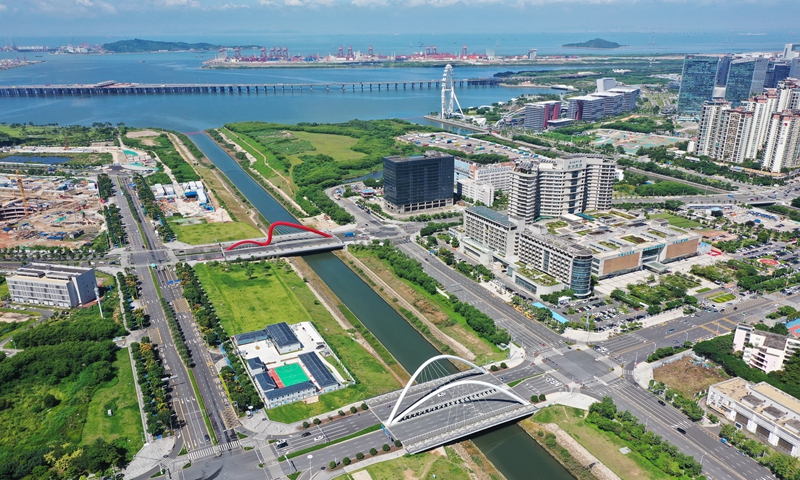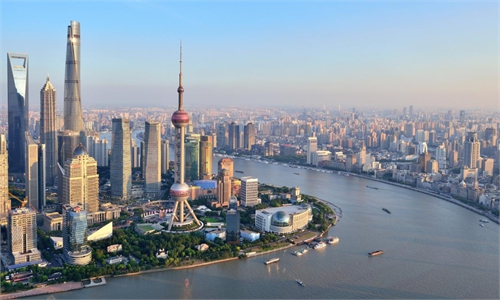From coastal regions to inland provinces, China’s opening-up thrives, shows determination of intl cooperation

Qianhai Shenzhen-Hong Kong Modern Service Industry Cooperation Zone in South China's Guangdong Province Photo: VCG
Chinese provinces have announced new policies to attract more foreign investment-backed companies to set up research and development (R&D) centers and head offices, in a bid to promote the nation's opening-up amid global uncertainties.
North China's Shanxi Province issued a document to encourage foreign investment-backed companies to set up R&D centers in the province, which has listed 13 measures including direct subsidies, enhanced financial support for innovative companies, promoting overseas experts' local work and life convenience, and simplifying cross-border settlement. The moves were announced on Thursday via its official WeChat account.
Up to 5 million yuan ($680,000) in subsidies can be granted, according to foreign investment-backed companies' performance, R&D expenditure and construction period.
China has sought to attract foreign investment and improve the business environment since the beginning of 2023, and practical measures announced by landlocked provinces such as Shanxi have been a highlight of this strategy, Dong Shaopeng, a senior research fellow at the Chongyang Institute for Financial Studies at the Renmin University of China, told the Global Times on Thursday.
"The campaign of attracting foreign investment is expanding from coastal regions to inland provinces, which reflects the further upgrading of China's high-quality opening-up," said Dong.
China will remove all restrictions on foreign investment in the manufacturing sector, which is a means for China to support an open world economy, one of the eight major steps to support high-quality Belt and Road Initiative (BRI) cooperation, the Xinhua News Agency reported on Wednesday.
Experts said that the move further shows China's determination in continuously promoting high-quality opening-up with concrete measures, which will also bolster the development of the nation's manufacturing sector.
The government of South China's Guangdong Province announced plans to support the high-quality development of the manufacturing sector via financial leasing, read an official document published on Thursday.
In the first half of 2023, Guangdong's GDP stood at 6.29 trillion yuan, up 5 percent year-on-year.
As one of China's economic powerhouses, Guangdong has vowed to enhance cross-border cooperation to build an international financial leasing center in the Guangdong-Hong Kong-Macao Greater Bay Area (GBA) by adopting simplified settlement policies in local special areas including Hengqin, Qianhai and Nansha.
The document allows qualified foreign investment-backed enterprises to set up financial leasing companies or hold stakes in them, and to introduce advanced management concepts and mechanisms.
The financial leasing business will cover aircraft, ships, integrated circuits, artificial intelligence and biomedicine, the document said, and local authorities vowed to introduce large-scale financial leasing enterprises from overseas.
Amid global challenges and China's expanding scale of foreign direct investment, the country has been implementing practical and realistic measures such as support policies and subsidies, and forming special groups to resolve problems for foreign firms, Tu Xinquan, dean of the China Institute for WTO Studies at the University of International Business and Economics in Beijing, told the Global Times on Thursday.
"The free trade agreement signed with Nicaragua at the end of August this year, and another one signed with Serbia during the third Belt and Road Forum for International Cooperation, and the master plan of the BRI initiative are all different forms and practices of China's opening-up strategy," said Tu.
A report on foreign direct investment (FDI) published by the Ministry of Commerce in September showed that FDI in 2022 reached $189.13 billion, up 4.5 percent year-on-year. From January to August 2023, the number of new foreign investment-backed enterprises hit 33,154, up 33 percent year-on-year, said the ministry.
Liu Xiaotao, Party chief of Suzhou, East China's Jiangsu Province, on Wednesday met with Alexandre Mérieux, chairman and CEO of bioMérieux, a French multinational vitro diagnostic company, according to media reports.
Liu appreciated the company's investment and business in Suzhou, and heard feedback from the company and helped resolve problems. Mérieux expressed confidence about bioMérieux's local projects, and said that the company will accelerate its operations and expand investment.
German pharmaceutical firm Bayer's first innovation center in China was opened in the Yizhuang zone of Beijing on Tuesday, according to media reports, in further tapping into the potential of the Chinese market.
Moreover, the sixth China International Import Expo will be held from November 5 to 10 in Shanghai. As of Wednesday, more than 3,000 enterprises from about 120 countries had confirmed their attendance and 60 countries will attend the country exhibition, Xinhua reported.
"It is normal to face international trade conflicts in a dynamic global market, but all problems can be solved if China follows its high-quality opening-up strategy for companies from all countries and regions," said Tu.


